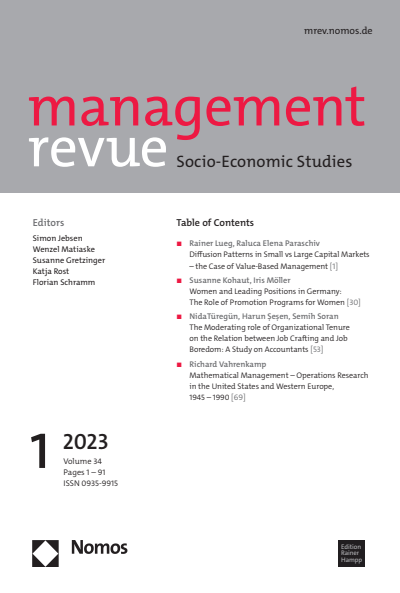Exploration of Team Mental Model Characteristics to Identify Opportunities and Hindrances in Global Virtual Teamwork
IF 1.7
0 MANAGEMENT
引用次数: 6
Abstract
While there is a significant volume of literature that studies teamwork, the research in virtual teams and global virtual teamwork is still developing. The current research acknowledges the popularity of virtual teamwork in today’s organizations and sheds light on the differences between global virtual and other forms of teamwork using different features of the team mental model. Compared to traditional or face-to-face teams, global virtual teams can usually achieve more significant team process gains, suggesting the existence of opportunities, while disengagement might lead to losses, indicating potential hindrances. This research aims to identify particular features of global virtual teamwork and ways in which they impact performance, using the concept of team mental model. The model is conceptualized as teams’ thought processes reflected in their members common knowledge. We examine the concept of team mental model in the form of cohesiveness, task abilities, and social loafing. We propose that virtual teams’ cohesiveness can present both opportunities and hindrances for team performance, promoting performance orientation, stimulated by the use of communication and collaboration technologies, while potentially hurting outcomes depending on the level of individualistic value orientations or anti-work norms are prevalent within the team. We also propose that global virtual teams benefit from epistemic opportunities because they have access to wide-ranging and far-reaching perspectives generated by diverse team members, as well as knowledge heterogeneity and within team cross-learning potential. Conversely, motivational losses in the form of social loafing and trust development hinder processes and outcomes of global virtual teamwork.团队心理模型特征在全球虚拟团队中的机遇与障碍探讨
虽然研究团队合作的文献很多,但对虚拟团队和全球虚拟团队的研究还处于起步阶段。当前的研究承认了虚拟团队在当今组织中的流行,并利用团队心理模型的不同特征揭示了全球虚拟团队与其他形式团队之间的差异。与传统或面对面的团队相比,全球虚拟团队通常可以获得更大的团队过程收益,这表明存在机会,而脱离参与可能导致损失,这表明潜在的障碍。本研究旨在利用团队心理模型的概念,确定全球虚拟团队的特定特征及其影响绩效的方式。该模型被概念化为反映在其成员共同知识中的团队思维过程。我们从团队凝聚力、任务能力和社会惰化三个方面考察了团队心理模型的概念。我们提出,虚拟团队的凝聚力既可以为团队绩效提供机会,也可以阻碍团队绩效,通过使用沟通和协作技术来促进绩效导向,同时潜在地损害结果,这取决于团队中普遍存在的个人主义价值导向或反工作规范的水平。我们还建议全球虚拟团队受益于认知机会,因为他们可以获得由不同团队成员产生的广泛而深远的观点,以及知识异质性和团队内部交叉学习的潜力。相反,以社会懒惰和信任发展为形式的动机损失阻碍了全球虚拟团队的过程和结果。
本文章由计算机程序翻译,如有差异,请以英文原文为准。
求助全文
约1分钟内获得全文
求助全文
来源期刊

Management Revue
MANAGEMENT-
CiteScore
1.20
自引率
0.00%
发文量
7
期刊介绍:
Management Revue - Socio-Economic Studies is an interdisciplinary European journal that undergoes peer review. It publishes qualitative and quantitative work, along with purely theoretical papers, contributing to the study of management, organization, and industrial relations. The journal welcomes contributions from various disciplines, including business and public administration, organizational behavior, economics, sociology, and psychology. Regular features include reviews of books relevant to management and organization studies.
Special issues provide a unique perspective on specific research fields. Organized by selected guest editors, each special issue includes at least two overview articles from leaders in the field, along with at least three new empirical papers and up to ten book reviews related to the topic.
The journal aims to offer in-depth insights into selected research topics, presenting potentially controversial perspectives, new theoretical insights, valuable empirical analysis, and brief reviews of key publications. Its objective is to establish Management Revue - Socio-Economic Studies as a top-quality symposium journal for the international academic community.
 求助内容:
求助内容: 应助结果提醒方式:
应助结果提醒方式:


